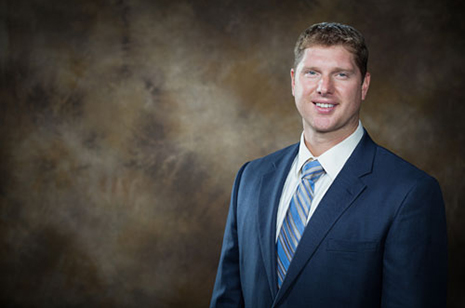FAYETTEVILLE, Ark. – A new office at the University of Arkansas will focus on teaching people involved in youth sports how to recognize concussions and will work with medical personnel to collect data about young athletes’ recovery from concussions.
R.J. Elbin, an assistant professor of exercise science, will direct the Office for Sport Concussion Research. He knows firsthand about concussions from his days as a high school football player and college baseball player.
“In addition to sustaining a few concussions as a former athlete, I have also coached at the youth and high school levels and saw how serious concussions can be,” Elbin said. “Concussions can have a major impact on athletes – not only on the field or court, but also in the classroom – and negatively affect their personal lives with family and friends.
“The most dangerous concussion is one that is undetected or unreported and mismanaged,” he continued. “Programs that increase education and awareness about the signs and symptoms of concussion are an important first step. I hope my research will help improve the standard of medical care and improve recovery outcomes for athletes with concussions.”
Tom Smith, dean of the College of Education and Health Professions, said the new office is a first step toward the University of Arkansas taking a leadership role in a field that is of critical importance to the health and well-being of athletes of all ages.
“Dr. Elbin worked with some of the nation’s leading concussion researchers at Michigan State University and the University of Pittsburgh before he joined our faculty in August,” Smith said. “An important piece of Dr. Elbin’s work is to educate parents and others to recognize the signs and symptoms of concussions.”
Studies looking at the effectiveness of concussion-education programs have been promising, Elbin said, and he wants to expand on those studies in Northwest Arkansas and across the state.
Elbin and his students are already working with local high schools, youth sports organizations and medical institutions on various concussion projects, and he plans to create new partnerships. The new office will create a system to track concussions in youth, high school and college sports and work with schools and other groups to be sure they have concussion policies in place that follow accepted standards.
“Using cutting-edge research and clinical tools, we will be able to document the short- and long-term effects of concussion,” Elbin said. “That will allow us to track recovery outcomes from this injury, and we will use this data to publish research and compete for funding to do more. This office will also help connect professionals who treat sport-related concussions and can work with us on this research. The ultimate goal is to make advances in detecting, managing and treating concussions.”
Elbin received a doctorate in kinesiology from Michigan State University, and he held a post-doctoral research fellowship at the University of Pittsburgh Medical Center Sports Medicine Concussion Program. The Pittsburgh program was the first of its kind when it was started in 2000. It remains the largest such program and is considered an international leader in concussion research.
Two graduate students in exercise science will be offered assistantships to work on concussion research and outreach education with Elbin. The Office for Sport Concussion Research will be part of the department of health, human performance and recreation.
Topics
Contacts
R. J. Elbin, assistant professor of exercise science
College of Education and Health Professions
479-575-5262,
Heidi Wells, content writer and strategist
Global Campus
479-879-8760,
